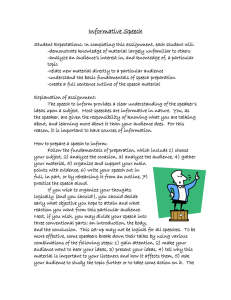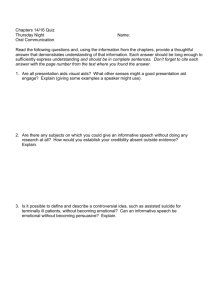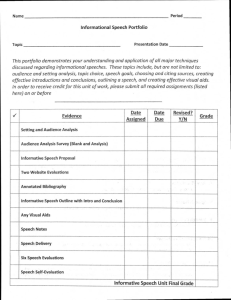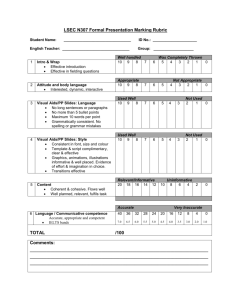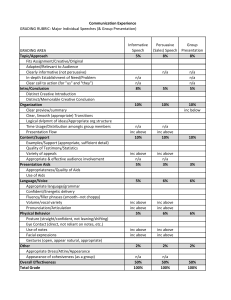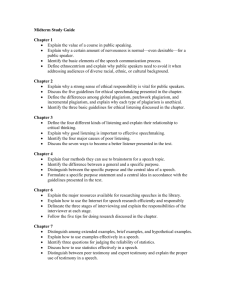II. NUMBER OF TIMES COURSE MAY BE
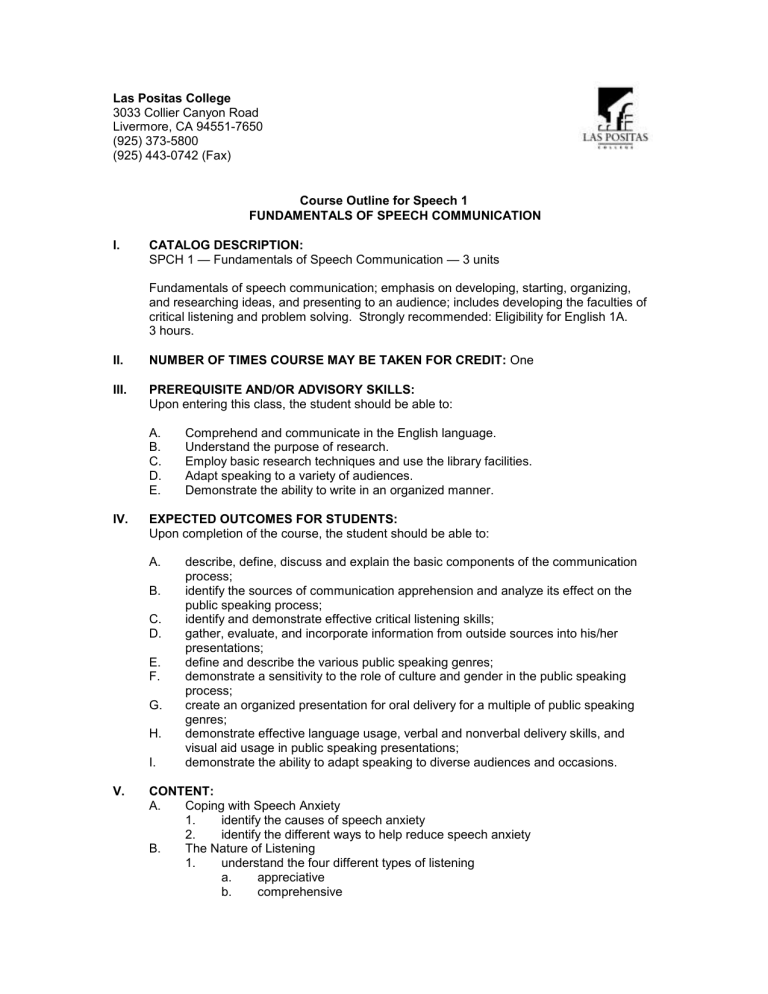
Las Positas College
3033 Collier Canyon Road
Livermore, CA 94551-7650
(925) 373-5800
(925) 443-0742 (Fax)
Course Outline for Speech 1
FUNDAMENTALS OF SPEECH COMMUNICATION
I. CATALOG DESCRIPTION:
SPCH 1 — Fundamentals of Speech Communication — 3 units
Fundamentals of speech communication; emphasis on developing, starting, organizing, and researching ideas, and presenting to an audience; includes developing the faculties of critical listening and problem solving. Strongly recommended: Eligibility for English 1A.
3 hours.
II. NUMBER OF TIMES COURSE MAY BE TAKEN FOR CREDIT: One
III. PREREQUISITE AND/OR ADVISORY SKILLS:
Upon entering this class, the student should be able to:
A. Comprehend and communicate in the English language.
B. Understand the purpose of research.
C. Employ basic research techniques and use the library facilities.
D. Adapt speaking to a variety of audiences.
E. Demonstrate the ability to write in an organized manner.
IV. EXPECTED OUTCOMES FOR STUDENTS:
Upon completion of the course, the student should be able to:
A. describe, define, discuss and explain the basic components of the communication process;
B. identify the sources of communication apprehension and analyze its effect on the public speaking process;
C. identify and demonstrate effective critical listening skills;
D. gather, evaluate, and incorporate information from outside sources into his/her presentations;
E. define and describe the various public speaking genres;
F. demonstrate a sensitivity to the role of culture and gender in the public speaking process;
G. create an organized presentation for oral delivery for a multiple of public speaking genres;
H. demonstrate effective language usage, verbal and nonverbal delivery skills, and visual aid usage in public speaking presentations;
I. demonstrate the ability to adapt speaking to diverse audiences and occasions.
V. CONTENT:
A. Coping with Speech Anxiety
1.
2. identify the causes of speech anxiety identify the different ways to help reduce speech anxiety
B. The Nature of Listening
1. understand the four different types of listening a. appreciative b. comprehensive
Course Outline for Speech 1
FUNDAMENTALS OF SPEECH COMMUNICATION
Page 2
2.
3. c. empathic d. critical incorporate listening activities to develop critical listening skills explanation of causes of poor listening and ways to improve listening
C. Analyzing the Audience and Environment
1. discuss appropriateness of topic selection and delivery
2. understand the effects of situational audience analysis a. size b. physical setting c. disposition toward the topic d. disposition toward the speaker e. disposition toward the occasion
3. description of demographic audience analysis
D. Ethical Speaking
1.
2. discussion of topic and language appropriateness discussion of speakers responsibilities (preparation, sound ethical goals, and honesty)
E. Organizing and Supporting your Message
1.
2. demonstrate fundamentals of library research technique identify possible structural patterns of organization
3. description of different types of evidence (examples, statistics, and testimony).
F. The Use of Language
1. explanation of the importance of using language effectively, accurately, and
2. clearly discussion of using language appropriately
G. Delivery
1.
2. discussion of what makes good delivery explanation of different methods of delivery (manuscript, memory, impromptu,
3. and extemporaneously) emphasis on the speakers voice and nonverbal behavior
H. Presentational Aids
1.
2. explanation of different kinds of visual aids description of how to incorporate visual aids into public speaking effectively
I. Informative Speeches
1. discussion of the different types of informative speech
2.
3. explanation of guidelines that go along with informative description of differences between informative and persuasion
J. Persuasive Speeches
1. explanation of three different types of questions involving persuasive speaking
2.
(fact, value, and policy) description of challenges surrounding persuasion and the listener process
K. Situational Speeches (Toasts, Ceremonials, Impromptu)
1. discussion of different types of speeches and occasions
2. tips and suggestions on effectively delivering situational speeches
L. Thinking and Speaking Critically (Reasoning)
1.
2. introduction into critical thinking explanation on how to incorporate evidence and reasoning into the speech
3. making process discussion of ways to build credibility.
VI. METHODS OF INSTRUCTION:
A. Lectures
B. Group discussions
C. Guest speakers
D. Written assignments
E. Test/quizzes
Course Outline for Speech 1
FUNDAMENTALS OF SPEECH COMMUNICATION
Page 3
F. Multiple oral presentations
G. Communication activities
VII. TYPICAL ASSIGNMENTS:
A. Informative speech: In a timed speech, you will teach your classmates, and myself, about some process or subject that will be useful and meaningful to us. Significance of the Informative topic will be important in assigning a grade. presentation aids, outside research and an outline will be required for your Informative presentation.
B. Persuasive speech description: In a timed speech, you will persuade your audience to take action about some problem that exists and is pertinent to us. Again, significance of the topic will be important in assigning a grade.
C. Some third type of speech description: In a brief timed speech, you will tell a story.
The story may be about an event that has helped shape your life, something you have heard or read about, or a story designed to illustrate a moral.
D. Written assignment description: Outlines will accompany the Informative speech and the Persuasion Speech. All outlines are due on the day you give your speech.
Outlines should be written in complete sentences and in APA style format. The outline must be typed and a finished product.
E. Written assignment description: A paper should accompany the storytelling speech detailing the content of the speech. This paper should be typed and double spaced.
It should be as error free as possible and a finished product.
F. Group work activity or group discussion activity: Throughout the semester there will be group activities which reinforce concepts delivered in classroom discussion.
These activities and brief presentations will count toward class participation.
VIII. EVALUATION:
A. Sample of a test question that might appear on a quiz
1. According to the textbook, the three goals of public speaking are?
B. Sample of a test question that might appear on a final
1. The _____ is the portion of the audience that the speaker most wants to persuade.
C. Speech assignment: In a 6-8 minute speech, you will persuade your audience to take action about some problem that exists and is pertinent to us. Significance of the topic will be important in assigning a grade. Presentation aids, outside research and an outline will be required. (100 Presentation aids, outside research and an outline will be required. (100 points: 80 points speech, 20 points outline worth 20% of total grade)
D. Written assignment: In an essay style paper, you will hand in your personal critique of your presentation including an evaluation of your strengths, weaknesses, and final
“grade” for your speech. This paper will be worth 20 points for a total of 3% of your semester grade.
E. Group assignment: In a group, you and your classmates will come up with the proper structure for a scrambled outline. You should work as a group and hand in the single finished product. This assignment will accumulate points toward your class participation grade.
IX. TYPICAL TEXTS:
A. Steven A. Beebe, Susan J. Beebe, Public Speaking: An Audience Centered
Approach , Latest Edition. Boston: Allyn and Beacon
B. Steven R. Brydon, Michael D. Scott, Between One and Many: The Art and Science of
Public Speaking , Latest Edition. London: Mayfield
C. Jaffe, Public Speaking: Concepts and Skills for a Diverse Society , Latest Edition.
London: Wadsworth
D. Stephen E. Lucas, The Art of Public Speaking, Latest Edition. New York: McGraw
Hill
Course Outline for Speech 1
FUNDAMENTALS OF SPEECH COMMUNICATION
Page
E. Dan O’Hair, Rob Stewart, Hannah Rubenstein, A Speaker’s Guidebook, Latest
Edition, New York: Bedford St. Martin’s
F. Jo Sprague, Douglas Stuart, The Speaker’s Handbook, Latest Edition, New York:
Harcourt College Publishers
X. OTHER MATERIALS REQUIRED OF STUDENTS:
None
Creation Date:
Revision Date: 4/10/02 spch1
4

